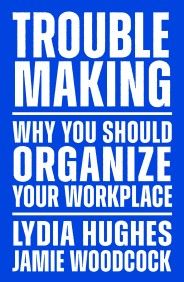Troublemaking: Why You Should Organize Your Workplace

There are no unorganisable workers, only workers yet to be organised.
There has been an explosion of organising among workers many assumed to be unorganisable, from delivery drivers in London to tech workers in Silicon Valley. The culmination of years of conversations on picket lines, in community centres, and in union offices, with workers in Britain, the US, India, Argentina, South Africa, Brazil, and across Europe, Troublemaking brings together lessons from around the world. Precarious workers waste collectors in Mumbai show that no worker is “unorganisable”, cleaner organising at LSE and St Mary’s hospital in London and Sans-papier workers in France indicate that demanding more at work can lead to big wins. Struggles like The Water Wars in Cochabamba, Bolivia show how we can use our power beyond the workplace.
From these movements, Lydia Hughes and Jamie Woodcock draw a number of lessons about why organising at work is the first step in building another world. They put forward three principles for organising. First, the need for action. Struggles can change the world, but they also change people who go through them. Rather than using action as a last resort, we need action to build a movement. Second, the need to build the rank-and-file of unions. Power comes from organising at work, not in trusting others to do it on our behalf. Third, democracy matters in organising. This is not only about winning, but also developing the confidence to build another kind of world. This is not a “how to” guide, but a set of principles for the politics of organising.
Endorsements
An inspiring and compelling case for workplace organizing - and the radical politics we need to rebuild a powerful workers' movement.
Eric Blanc, author of Red State Revolt
No advance for working people has been achieved without troublemaking and a read of this book will turn many more into effective troublemakers. Drawing on the hard fought struggles of workers to organise and mobilise in recent times the book not only inspires but also explains concisely how our economic system operates and how it can be challenged successfully.
John McDonnell MP
Troublemaking makes clear through real, lived examples in the book that we can learn from past workers' struggles and how looking at previous tactics and strategies can inform our actions today.
Sarah Woolley, General Secretary, Bakers Food and Allied Workers Union
Troublemaking provides inspiring examples of workers struggles and puts them in the context of the nature of work under capitalism and the fight to transform society. It makes a powerful case for troublemaking at work and building workers' rank and file power.
Ian Allinson, workplace activist and author of Workers Can Win! A Guide to Organising At Work
Troublemaking is a unique guide to the path from today's struggles to a socialist future that can help inspire a new generation of workplace and union activists to set foot on that risky road.
Kim Moody, a founder of Labor Notes and author of Breaking the Impasse: Electoral Politics, Mass Action & The New Socialist Movement in the United States
Reviews
- Dazed, All the books you should read in 2023, December 2022.
- The Journalist, Becoming Visible, April-May 2023.
- Red Pepper, by Laura Hone, 24th April 2023.
- Jacobin, There’s No Such Thing as a Spontaneous Strike, by Matt Seidel, 11th May 2023.
- Work-Bites, Troublemaking Goes International..., by Kevin Van Meter, 25th March 2024.
Excerpts
- Red Medicine, How Outsourced Cleaners Organized and Won.
- Verso Blog, Why should white-collar workers unionise?
Podcasts
- Verso, Workplace organising in the tech industry, with John Chadfield and Ben Smoke, 22nd May 2023.
- Verso, Where should the Trade Union movement go from here?, with Lydia Hughes and Ben Smoke, 26th May 2023
- New Economics Podcast, Should we all be troublemakers at work?, Ayeisha Thomas-Smith with Lydia Hughes, 10th May 2023.
Misc
As part of a fundraiser for In These Times to cover ongoing labour disputes in the US, a copy of Troublemakers was offered to supporters donating $20 or more.